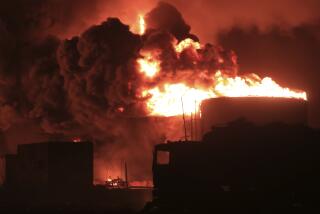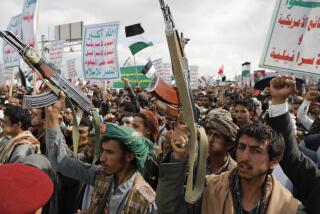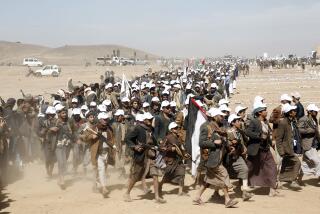Blast just one sign of Yemen’s strife
SANA, YEMEN — A brutal insurgency rages in the northern highlands. Separatist discontent grows in the south. Al Qaeda is moving in, targeting oil facilities and foreigners as well as ordinary Yemenis.
In the latest unrest, at least five people were killed Saturday in an explosion at a post office in the northern town of Sadah, one of numerous hot spots in this Arabian Peninsula country of 23 million.
Observers fear that Yemen is descending into chaos -- a prediction made more dire by its proximity to a critical choke point through which one of every 25 barrels of the world’s daily oil output passes en route to the United States and Europe.
“Yemen is located next to some very important real estate where there’s a lot of oil,” said Mark Katz, a George Mason University political scientist who has studied Yemen for a quarter of a century. “Even if everything goes right in Iraq, even if we have rapprochement with Iran, Yemen is still a time bomb for the region.”
The Bab al Mandab strait, off Yemen’s southwestern edge, is one reason the West, Iran and neighboring Saudi Arabia have taken a heightened interest in this once-ignored corner of the Middle East. The U.S. State Department recently sent an envoy to Sana, the capital, to discuss weapons smuggling, one of Yemen’s many afflictions.
A badly destabilized Yemen would be a “disaster” for the Middle East and the Horn of Africa as well as the West, said Mohammed Abulahoum, a leading member of Yemen’s ruling party.
“You don’t want another Somalia in this region,” he said.
Like those before him, long-reigning President Ali Abdullah Saleh has ruled the fractious Muslim country by pitting tribe against tribe and sect against sect. But critics say at least one of his gambits misfired disastrously, spurring a Shiite insurgency that has drained scarce government resources.
“The war has established a network of interests and financial interests,” said Nabil Subaye, editor of the newspaper Neda, whose managers are being tried in court for reporting on details of the fighting. “The government doesn’t want anyone to know what is happening. We are not even allowed to go to the military hospital to see wounded soldiers.”
Five peace agreements have collapsed since the fighting began four years ago, with each renewal of clashes more fierce than the last. Time and again, employees of aid agencies working in the north have seen massive convoys of tanks heading north and reported helicopter sorties targeting rebel fighters, estimated to number 3,000 to 15,000, holed up in the caves and mountains of Sadah province.
Some describe the fighting as proxy war between Shiite Iran and Sunni Saudi Arabia. But Tehran maintains friendly ties with the government in Sana, and most officials and experts doubt that Iran could supply the rebels, who belong to the Zaidi sect of Shiite Islam, with anything more than moral support.
“Zaidis and Shiites have some things in common,” said Ali Saif Hassan, executive director of the Political Development Forum, a pro-democracy nonprofit organization. “But mostly [they] think they are close to Iran. They are inspired by Iran” and movements it supports, such as Hezbollah and Hamas.
The Yemeni government insists that it has tried to make peace with the rebels only to be repeatedly rebuffed. “If they do not accept negotiations, we have to fight them,” said Hossein Hazab, an official in Saleh’s ruling circle.
But if the troubles in the north are draining precious resources, the rising discontent in the south could split the country in half, again. Until the collapse of the Soviet Union, communist South Yemen was a separate country. Reunification began in 1990. A short war broke out in 1994 as the south chafed under the rule of the more populous and wealthy north.
Now the south, which includes the Bab al Mandab and some of the country’s key oil fields, is clamoring again for more autonomy. The movement, based in the southern port city of Aden, has developed ties with the expanding network of civil society and pro-democracy groups in the capital demanding government accountability and transparency.
“The south is very serious,” said Abdullah Faqih, a professor of political science at Sana University. “These people have a strong state and oil, and they want out.”
The president’s defenders acknowledge that the government has made mistakes in the past, but say its opponents are unreasonable, refusing to acknowledge a record that includes new schools and roads in the countryside as well as a smattering of foreign investment, including a $2.8-billion gas deal with the French company Total signed in May.
“The problem with the opposition is that they don’t try to meet in the middle,” said Hazab, a member of the government’s leadership committee. “They see everything as black or white.”
But even if the government resolves its problems in the north and south, Al Qaeda has also reemerged throughout Yemen, the homeland of Osama bin Laden’s ancestors. The group’s loyalists were allegedly responsible for the 2000 bombing of the U.S. destroyer Cole while it was harbored in Aden, killing 17 Americans, and the attack on the French-flagged oil tanker Limburg in 2002.
After several years of relative calm, they’ve apparently resurfaced. Last year, a suicide bomber killed at least nine people in an attack on Spanish tourists. Two Belgian tourists were killed in a suspected Al Qaeda attack in January, and in May, a bomb blast at a mosque killed 18 people.
Such instability has scared off foreigners and squelched possibilities for developing a country that is one of the poorest outside Africa. Many observers say Yemen’s various problems feed off one another, that the war in the north prompts a secluded government to crack down on liberal democracy activists and paves the way for more extremists.
“The lack of democracy led to Al Qaeda,” said Mustafa Raja, a Sana writer. “Development and the rule of law are the only ways to stop the threat.”
--
More to Read
Sign up for Essential California
The most important California stories and recommendations in your inbox every morning.
You may occasionally receive promotional content from the Los Angeles Times.










